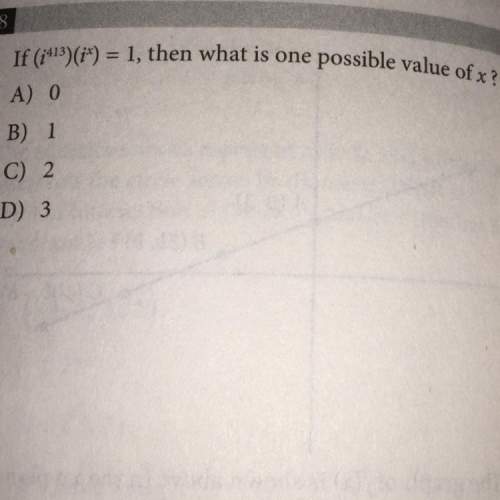Use cosacosb=1/2[cos(a+b)+cos(a-b)] to derive cosx+cosy=2cos(x+y/2)cos (x-y/2)
...

Mathematics, 11.11.2020 22:00 ioldelk123
Use cosacosb=1/2[cos(a+b)+cos(a-b)] to derive cosx+cosy=2cos(x+y/2)cos (x-y/2)
![Use cosacosb=1/2[cos(a+b)+cos(a-b)] to derive cosx+cosy=2cos(x+y/2)cos (x-y/2)](/tpl/images/1914/1595/23e89.jpg)

Answers: 1


Other questions on the subject: Mathematics

Mathematics, 21.06.2019 13:20, gobbler80
Part a what is the area of triangle i? show your calculation. part b triangles i and ii are congruent (of the same size and shape). what is the total area of triangles i and ii? show your calculation. part c what is the area of rectangle i? show your calculation. part d what is the area of rectangle ii? show your calculation. part e rectangles i and iii have the same size and shape. what is the total area of rectangles i and iii? show your calculation. part f what is the total area of all the rectangles? show your calculation. part g what areas do you need to know to find the surface area of the prism? part h what is the surface area of the prism? show your calculation. part i read this statement: “if you multiply the area of one rectangle in the figure by 3, you’ll get the total area of the rectangles.” is this statement true or false? why? part j read this statement: “if you multiply the area of one triangle in the figure by 2, you’ll get the total area of the triangles.” is this statement true or false? why?
Answers: 2

Mathematics, 21.06.2019 17:30, chaparro0512
Astore sells two types of radios. one type sells $87 and the other for $119. if 25 were sold and the sales were $2495, how many of the $87 radios were sold a) 5 b) 20 c) 15 d)10
Answers: 2

Mathematics, 21.06.2019 19:00, amayareyes101
What are the solutions of the equation? z^2 + 11z + 24 = 0 a. 8, -3 b. 8, 3 c. -8, -3 d. -8, 3
Answers: 2
You know the right answer?
Questions in other subjects:


Social Studies, 13.10.2019 15:30






History, 13.10.2019 15:30





